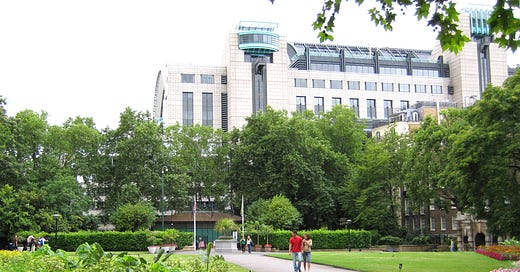Who was Mr Ward?
He operated a detective agency in central London in the 1870s and 1880s, but managed to keep his own identity secret...
In January 1879, a detective agency opened at Chandos Chambers, 22 Buckingham Street, London. In a five-storey office building on this short road, between Strand and the then five-year-old Victoria Embankment Gardens, operated Mr Ward, one of the earlier detectives to set up shop here. In the early 20th century, Harry Smale (subject of last week's article) ran his own detective agency from Buckingham Street, so the road had a history of being used for these purposes.
Victoria Embankment Gardens today (image by Alexrk2)
Mr Ward advertised his agency in the London press between January 1879 and August 1881: after this date, no adverts survive, and it seems that this is when the agency stopped operating. But within this timeframe, the agency advertised regularly. Mr Ward could be consulted daily on divorce and other cases; his 'large staff of male and female detectives' were available to work on libel cases, tracing missing friends, financial losses and robberies.
Normally, I raise an eyebrow at any mention of substantial numbers of staff mentioned in adverts, particularly for agencies that only operated for a couple of years or less. It was common for individuals to exaggerate the number of people they had working for them in order to present themselves as large, successful agencies. However, Ward went beyond this. In August 1879, he placed a notice in the Evening Standard stating that he was proposing giving 'those of his staff not at present actively engaged' the following Bank Holiday Monday off. This notice was placed both to present himself as a benevolent employer, but also to encourage potential clients with urgent cases to get in touch with him as soon as possible, so that he could book staff onto the cases rather than risk them being on holiday when cases came in.
Ward always advertised as 'Mr Ward' and made no claims of prior experience, beyond stating, in April 1880, that his agency was 'old established'. In November that year, he also stated that he operated a 'high class' private inquiry office. There were no other clues as to who he was.
A study of the 1881 census for 22 Buckingham Street does not help. It was an office building, and so the residents of that building at the time of the census were not those who rented offices, but the housekeeper - Ellen Costlett, a 48-year-old widow, who lived there with her son and who looked after the offices.
I suspect that 'Mr Ward' may have been a man who, in 1881, actually lived elsewhere in Westminster. The head of household at 114 Tachbrook Street, Pimlico, was a Henry Ward. He gave his occupation as a detective - with initials afterwards: perhaps either PC (police constable) or PS (police sergeant), but the entry is unclear. What's particularly interesting about Ward is that, despite his English name, he was a native of Warsaw, Poland. His wife, named as Vera Ward, was from St Petersburg. The Wards can't be found under those names on any other census, and I can't find a marriage for these individuals. Having found several others, in my research, who were from elsewhere in Europe and who anglicised their names months or even years after their arrival into Britain, I suspect that Henry and Vera were born with different names and changed them informally at some point.
Was Henry Ward a police officer, or was this an attempt at categorisation or an assumption made by an enumerator? Given the lack of other candidates, it could well be that the Polish man who had come to England and assimilated himself as the very English-sounding Mr Ward was also able to become a good private detective, as he was able to take on different roles and be believable as them. However, he only ran his agency for two or so years, before he disappeared behind the curtain of invisibility again.





I wonder what happened to the archives of the agency? Destroyed I suppose!